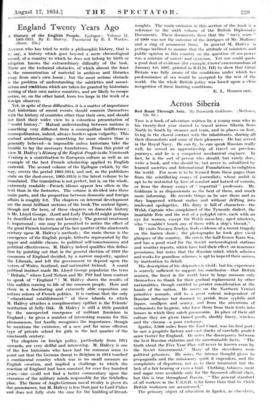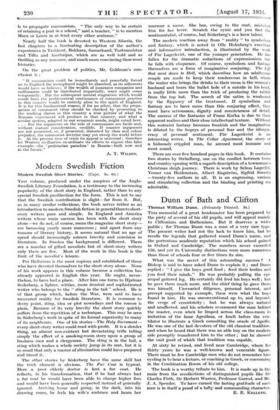Across Siberia
Tuts is a book of adventure written by a young man who in his twenty-first year started to travel across Siberia front North to South by steamer and train, and in places on foot, living in the closest contact with the inhabitants, sharing all their discomforts and some of their pleasures. He has served in the Royal Navy. He can fly, he can speak Russian really well, he served an apprenticeship of travel on previous journeys, and he is a competent mechanical engineer. In fact, he is the sort of person who should, but rarely does, write a book, and who should be, but never is, subsidized by learned societies and International Foundations to enlighten the world. For more is to be learned from these pages than from the scintillating essays of journalists, whose ambit is apt to be restricted by love of comfort and hatred of vermin, or from the dreary essays of "impartial" professors. Mr. Goldman is as dispassionate as the best of them, and much more informing. He records things as he saw them and as they happened without malice and without drifting into irrelevant apologetics. His diary is full of characters—the Welsh Captain who complained of the Tyneside dialect, the insatiable Eric and the rest of a polyglot crew, each with an eye for women, except the Welsh mess-boy, aged nineteen, who "wouldn't touch any of them with a ship's biscuit."
He visits Novaya Zemlya, finds evidence of a recent tragedy on the barren shore ; the photographs he took give vivid glimpses of the country. He enters the half-frozen Kara Sea, and has a good word for the Soviet meteorological stations and weather reports, which have had their effect on insurance premiums, but notes that the Russian mind, which admires and works for grandiose schemes, is apt to imperil their success by inattention to detail.
His description of his shipmates is vivid : but his experience is scarcely sufficient to support his conclusion—that British seamen, the finest in the world, have in large measure only themselves to thank for their gradual replacement by other nationalities, though entitled to greater consideration at the hands of the nation. He meets on the Northern Yenisei primitive nomads, still to a great extent independent of Russian influence but doomed to perish, from syphilis and liquor, smallpox and scurvy, and from the attentions of enthusiasts for hygiene, who force them from their tents into houses in which they catch pneumonia. In place of their old culture they are given tinned goods, shoddy finery, wireless and the cinema—a poor exchange.
Igarka, 3,000 miles from the East Coast, was his first port: he saw a graphite factory and vast stacks of carefully graded sawn thither for England. He notes the discrepancy between the best Russian statistics and the ascertainable facts. "The truth about the Five Year Plan will never be known even by the Soviet Government." Many of the stevedores were political Prisoners. He notes the intense thought given to propaganda and the missionary spirit it engenders, and the complaints of deportees, not as to their treatment but the lack of a fair hearing or even a trial. Clothing, tobacco, -meat and sugar. were available only for the favoured official class, but this is true throughout Russia. "The general standard of all workers in the U.S.S.R. is far lower than that to which British workmen are accustomed."
The primary object of education in Igarka, as elsewhere,
is to propagate communism. "The only way to be certain of retaining a post in a school," said a teacher, "is to mention Marx or Lenin in at least every other sentence."
Nearly half the book is devoted to Western Siberia, the last chapters to a fascinating description of the author's experiences in Tashkent, Bokhara, Samarkand, Turkmenistan and Tiflis and Azerbaijan, which are as well told and as thrilling as any romance, and much more convincing than most histories.
On the great problem of politics, Mr. Goldman's con- clusion is :
"If communism could be immediately and peacefully forced on to England the unemployed might be absorbed, as its adherents would have us believe ; if the wealth of insurance companies and millionairee could be distributed impartially, want might cease temporarily. But the subsequent mental stagnation which would result from the problematical continuance of communist practice in this country would be entirely alien to the spirit of England. It is for this fundamental reason if for no other, that the propa- gation of communist ideas should be checked by presenting to the working classes in this country a true picture of what the Russian experiment will produce in that country, and what a • similar system, adapted to our economic needs, might entail here. . . . For the arguments on the side of communism are facile and, without mature consideration, credible. If counter arguments are not presented, or, if presented, distorted by class and colour prejudice, the communist doctrine may yet sweep the world before it. At the present time of crisis its appeal is universal ; therefore let Western civilization co-ordinate its efforts to expose this false example—the 'proletarian paradise' in Russia—both now and in the future."
A. T. WILSON.



































 Previous page
Previous page